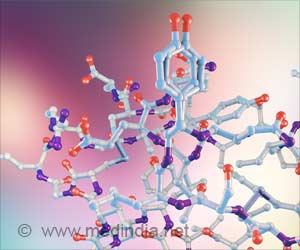Blood pressure medication metolazone activates mitochondrial unfolded protein response (UPRmt) process that repairs mitochondria, and promotes cell survival.

‘Blood pressure medication metolazone activates mitochondrial unfolded protein response (UPRmt) process that repairs mitochondria, and promotes cell survival. The genes atfs-1, nkcc-1, and ubl-5 are essential for metolazone function.’
Read More..




Specifically when damage to mitochondria occurs their function is impaired. To repair the mitochondria and promote cell survival, a process called mitochondrial unfolded protein response (UPRmt) occurs. By identifying the drugs that activate UPRmt, some scientists think it is possible to increase the lifespan of mitochondria.Read More..
The study conducted by Dr. Eriko Kage-Nakadai and her colleagues from Osaka City University in Japan is published in the journal Biogerontology.
Dr. Kage-Nakadai has explained that though aging is not a disease, drugs can slow down aging and reduce or prevent their negative effects on a patient’s health. Current research has shown promising results.
Experiments were conducted by using a commonly used biological research model - Caenorhabditis elegans worm. Several compounds were identified that can increase the lifespan of worm by activating UPRmt.
Identifying the Anti-aging Drugs
Advertisement
By using this method, the researchers identified the drug metolazone, which increased the lifespan of the worm. Metolazone is a thiazide-like diuretic which used to treat high blood pressure and heart failure.
Advertisement
Metolazone also activated the expression of hsp-6 (Hspa9 in humans) in HeLa cells (a human cell line commonly used in biological research). This shows that the drug’s UPRmt-related effects can be seen in multiple species.
Talking about the broader significance of her work, Dr. Kage-Nakadai comments, "What is particularly exciting is that we tested already available approved drugs here, and we have revealed the potential of repurposing existing drugs for aging control. Worms always give us many hints."
The researchers have stated that this work is just the start and it can provide new anti-aging drugs. In future humans living longer than 120 years can become a reality.
Source-Medindia















